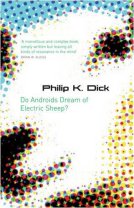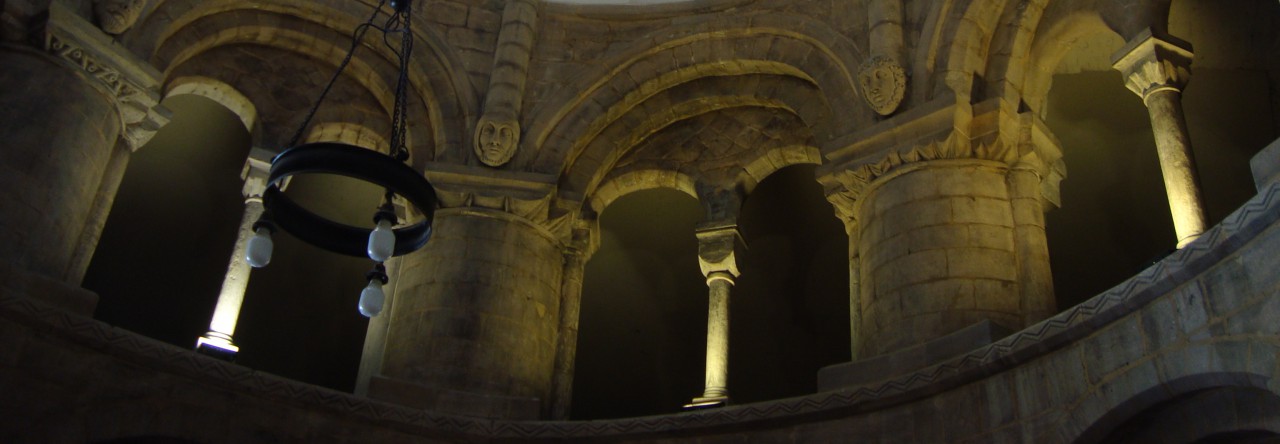
Philip K Dick
Do Androids Dream Of Electric Sheep?
Gollancz 2007 (1968)
 What can be said about this famous novel — ostensibly about a detective chasing dangerous androids — that hasn’t been said before, and better? Rather than a closely argued review, this overview will be about impressions, rather like the 2007 Gollancz cover picture which, to my chagrin, I didn’t immediately realise was a colour dot-matrix image of a sheep. A case, I suppose, of being too close to it in the first place. Anyway, I learnt my lesson, and waited a while before committing some thoughts to electronic page.
What can be said about this famous novel — ostensibly about a detective chasing dangerous androids — that hasn’t been said before, and better? Rather than a closely argued review, this overview will be about impressions, rather like the 2007 Gollancz cover picture which, to my chagrin, I didn’t immediately realise was a colour dot-matrix image of a sheep. A case, I suppose, of being too close to it in the first place. Anyway, I learnt my lesson, and waited a while before committing some thoughts to electronic page.
First, what this book isn’t. It’s not Ridley Scott’s Blade Runner, however much I tried to accommodate the film’s images to the text, and however much I tried to second-guess the way the book’s narrative was heading. Ridley Scott’s film is claustrophobic, the post-apocalyptic cityscape teeming with multitudes on the streets (despite the empty voids of buildings lining them). The novel on the other hand employs a short dramatis personae, and you are hardly, if ever, aware of anyone much else in the polluted environment that Deckard the android hunter inhabits. And of course the Final Cut of the film implies Deckard is a replicant, whereas I think the novel comes down firmly in favour of his flawed but real humanity (though others may disagree). In many ways this is a mirror image of the theme found in Frankenstein and a reflection of the final voyage in Gulliver’s Travels: it may be possible to create or find organisms that are simulacra of perfect, noble-minded human beings, but it seems impossible to cross over the divide of Otherness.
More impressions: Dick is a wordsmith and well-read with it (so, unlikely as it may seem in a future dystopia, are his characters), and that introduces a complexity that simple analysis along the lines of “This book is about…” will simply not start to unravel meaningfully. So I try to let the images that he does implant in my brain work their insiduous magic over time: images like the android (or ‘andy’) toad in the desert, the Mercer empathy machines, the character Rachael killing Deckard’s animal purchase. Other intuitions are more shadowy: the ubiquitous figure of Mercer, resonating with Christ-like attributes — such as being a willing sacrificial victim — seems also to embody Dick’s critique of corporate business (after all ‘Mercer’ is derived from the same root as its synonym, ‘merchant’), its stranglehold over the media and its encouragement of acquiescence in a somnolent population. It all starts to sound creepily prescient for a work of fiction from the sixties.
And the question posed in the title, do androids dream of electric sheep? It depends who’s asking and who’s replying, and if there’s an awareness of the sheep being artificial. If Deckard is asking himself it’s because he doubts his status. Maybe Dick is really asking us, the readers, how independent we really are or if someone is controlling us, whether we are what we think we are or merely simulacra.
And this, I think, is one of my final impressions. To analyse Do androids dream may be like taking a creature and by dissecting it on a bench effectively end up killing it. Whether artificial or real, I’m not sure that ‘retiring’ this creation is the right way to appreciate it. That’s a cop-out, I know, but there you are.

No need to feel sheepish about not recognising the dot matrix, which did tend to pull the wool over my eyes too. Was Mercer a merchant using a baa-ter system? (Okay, okay, I’ll stop now.)
Another I have missed, but think I should seek to un-miss..
LikeLike
I mutton ram home the point but I find myself on the horns of a dilemma where Philip K Dick is concerned: I wouldn’t say I liked his work — too obscure and confusing at times, even frustrating — but it stimulates and questions remorselessly. So do I recommend him? Easy answer: yes and no.
LikeLike
🙂
Thank you for the buzz of March-ing forward with that definite May bee.
LikeLike
Yes, sorry, it’s a bland reply that needs a bit of seasoning.
LikeLike
Enough already!
PS I’m posting this response on an Android phone — appropriate, eh?
LikeLike
This is on my 1001 list and I’m looking forward to reading it at some point. Glad to know it’s not a lot like Blade Runner. I liked that movie on some levels but also there was something about it that didn’t sit right with me. Blade Runner is on my top 100 AFI films. It was 99 or something near there.
LikeLike
Yes, the film is like a cinematic re-boot of the book, yet it’s hard not to picture Harrison Ford when reading it. Looking forward to your take on it!
LikeLike
A reviewer compared my book to Philip K Dick (I was very flattered) saying I wear my influences on my sleeve, yet the truth is I’ve never read any of his work. If I was going to (and I still plan to) this would be my first port of call.
Having read your review I’m looking forward to it even more, even if I’m feeling a little ‘sheepish’ given the comparison.
LikeLike
I’ve only read five of his novels and the novella Minority Report but this is reasonably accessible. I prefer The Man in the High Castle mainly because it’s straightforward alternate history, whereas most of his other stuff mixes alternate history, alternate realities and (now very dated) science fiction so that the reader isn’t sure where anything is headed. It repays some work, including re-reads otherwise it just appears an unholy mess.
I’m absolutely sure that’s not what your reviewer was getting at — and I’m aware that I haven’t even acquired your book yet, let alone reviewing it. Soon, I promise!
LikeLike
I don’t know, maybe he was…
I wasn’t chasing you, I promise. I’m delighted you have shown an interest. I’ve seen a photo of your reading pile so any time in the next 10 years or so would be lovely!
LikeLike
I’ve read the review extract on your recent post, Dylan, and I see where he’s coming from with his PKDick reference. Dick’s increasing descriptions of altered realities and paranoia in his novels is down to his drug use, and the recreational use of drugs mentioned in your novel is what reminded the reviewer of the US writer and suggested your supposed indebtedness to him.
LikeLike
I love his work. I haven’t read this one yet, probably because the movie is one of my favorites. I’ve stayed away because I know I would compare the two. You’ve convinced me that I should go ahead and add it to my collection.
LikeLike
I do like going back to originals, however good or bad, if only to appreciate the process of adaptation but mainly to discover the source of inspiration for myself.
LikeLike
Now this I do need to read, partly just because its classic SF and partly because whenever I hear/read about it it sounds so intriguing. I’ve never seen Blade Runner, which sounds like it may be an advantage.
LikeLike
I sort of wish I’d read the book first, Rebecca, then I wouldn’t have been so distracted and have expectations confounded. You’re doing it the right way round!
LikeLike
What a strange book. I have to admit I am not a big fan of the movie either. It’s visually compelling, but apart from that… just not my thing, I guess.
LikeLiked by 1 person
I do admire the film, Beth, though I’ve only seen it twice since it came out … nearly forty years ago! Hmm. I think, revisiting my review, that I may have needed more than one read to ‘get’ what this book may have been about.
Dick seems to have been obsessed with the disjunct between what is real and what isn’t but seems so, here in DADOES (can an android be as valid as a human), in Ubik (who is dreaming who), in The Man in the High Castle (where the debate is about authenticity, and whether it really matters that something is genuine or a convincing fake to have value), and The Penultimate Truth (about fake news and simulacra). Must read/reread some more — I’ve got a collection of short stories somewhere…
LikeLike